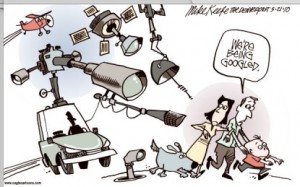The US has demanded over recent years that India buy defense weapons, allow big US corporate banks into the country, and ease patents helping Big Pharma. Prime Minister Modi, who was banned from the US six years ago, has a long memory. He will demand parity with the US. President Obama says that this relationship is a big US priority? Can we move forward? Modi wants investors to flock to the manufacturing sector. He is looking to China and Japan.
Author Archives: Lily Fleur
Should Growth Cease to be the Goal?
George Monbiot writing in the Guardian: Economic growth is an artifact of the use of fossil fuels. Before large amounts of coal were extracted, every upswing in industrial production would be met with a downswing in agricultural production, as the charcoal or horse power required by industry reduced the land available for growing food. Every prior industrial revolution collapsed, as growth could not be sustained(3). But coal broke this cycle and enabled – for a few hundred years – the phenomenon we now call sustained growth.
It was neither capitalism nor communism that made possible the progress and the pathologies (total war, the unprecedented concentration of global wealth, planetary destruction) of the modern age. It was coal, followed by oil and gas. The meta-trend, the mother narrative, is carbon-fuelled expansion. Our ideologies are mere subplots. Now, as the most accessible reserves have been exhausted, we must ransack the hidden corners of the planet to sustain our impossible proposition.
On Friday, a few days after scientists announced that the collapse of the West Antarctic ice sheet is now inevitable, the Ecuadorean government decided that oil drilling would go ahead in the heart of the Yasuni national park(5). It had made an offer to other governments: if they gave it half the value of the oil in that part of the park, it would leave the stuff in the ground. You could see this as blackmail or you could see it as fair trade. Ecuador is poor, its oil deposits are rich: why, the government argued, should it leave them untouched without compensation when everyone else is drilling down to the inner circle of hell? It asked for $3.6bn and received $13m. The result is that Petroamazonas, a company with a colourful record of destruction and spills(6), will now enter one of the most biodiverse places on the planet, in which a hectare of rainforest is said to contain more species than exist in the entire continent of North America.
The UK oil company Soco is now hoping to penetrate Africa’s oldest national park, Virunga, in the Democratic Republic of Congo(8); one of the last strongholds of the mountain gorilla and the okapi, of chimpanzees and forest elephants. In Britain, where a possible 4.4 billion barrels of shale oil has just been identified in the south-east(9), the government fantasises about turning the leafy suburbs into a new Niger delta. To this end it’s changing the trespass laws to enable drilling without consent and offering lavish bribes to local people. These new reserves solve nothing. They do not end our hunger for resources; they exacerbate it.
The trajectory of compound growth shows that the scouring of the planet has only just begun. As the volume of the global economy expands, everywhere that contains something concentrated, unusual, precious will be sought out and exploited, its resources extracted and dispersed, the world’s diverse and differentiated marvels reduced to the same grey stubble.
Class Action Lawsuit Awards Parents for Apps Their Kids Charge
Time Online reports that for fifteen minutes after a parent has signed off from their Itunes account, anyone can go online and charge to that account. Kids have been doing this the world over. In January Apple agree to reimburse over 24 million dollars to parents whose children, unattended, shopped in the Apple Store.
Time notes that children should gain experience with money in the real world, so that they can grasp the issues of charging to their parents’ account.
Using Executive Pay to Take the Risk Out of Banking
Making banks more secure has become the holy grail of regulators writes Mark Roe.
Tying senior managers’ pay to the bank’s stability, the financial sector, advocates argue, would be forced to police itself. This incentive-based regulation could bolster economic stability more effectively than expecting regulators to keep pace with banks’ risky activities.
The proposal is not perfect – not least because bank managers’ compensation would still be tied to profits. If a banker is told that he or she will be compensated entirely in bonds this year, with the bank’s annual profits determining the number of bonds to be received, the banker would obviously want to boost this year’s profits – even if it required taking bigger risks.
Despite these challenges, a new, bond-based compensation strategy could enhance bank stability considerably. Though there is no silver bullet for bank regulation, implementing such a system with care and vigilance would be an important step in the right direction.

Swiss Vote Down $25 Minimum Wage
Swiss voters resoundingly rejected a measure that would have hiked the country’s minimum wage to the highest level in the world. If approved, the referendum would have raised the national minimum wage to $25 an hour. Bloomberg reports that 76.3 percent of voters no on the measure.
Trade unions sponsored the wage proposal as way of fighting poverty in a country that, by some measures, features some of the world’s highest prices. But opinion polls indicated that most voters side with government and business leaders, who have argued it would cost jobs and erode economic competitiveness.
Switzerland currently has no minimum wage, but the median hourly wage is about 33 francs ($37) an hour.
The Organization for Economic Cooperation and Development lists the highest current minimum wage as Luxembourg’ at $10.66 an hour, followed by France at $10.60, Australia at $10.21, Belgium at $9.97, and the Netherlands at $9.48. The U.S. minimum wage of $7.25 came tenth on the list. The OECD adjusted figures for spending power.
The Nature Conservancy and Dow Chemical Team Up
Mark Tercek who heads up the Nature Conservancy made lot of money as a Goldman Sachs partner. Daniel Max, writing in the New Yorker, looks at what he has done to raise environmental and global warming awareness, not by scolding and accusing, but by pointing out the advantages of being green-aware. Not to stave off picketers, but rather as a good business practice that does not cost any more, and may cost less in the long run.
When Terek opened up conversations with Dow, he told them that the Nature Conservancy were not eggheads out of touch with the real world.
Already Dow is helping rebuild marshes near its Texas plant. This has a future benefit. Global warming is going to make water encroach on Dow’s factory territory. The marshes will keep the waters at bay, and cost much less than building barriers.
Is this a model for going well by doing good?
Engaging Shareholders in Active Ownership
The long-term health of pension plans, and the retirement security of participants and families who rely upon them, are threatened by conflicts of interest on Wall Street and in the boardroom, a corporate backlash that seeks to weaken the accountability of executives to shareholders, and outright corporate fraud. Advisory groups who are not named as fiduciaries for pension funds have cropped up to help the share. CtW Investment organized a vote against excessive compensation for the executives of Chipotle and won. Yet this may be a pyrrhic victory because the Board does not have to abide by the vote.
European Privacy Rights Trump Big Data
People should have some say over the results that pop up when they conduct a vanity search online, Europe’s highest court said Tuesday. In a landmark decision, the Court of Justice of the European Union said Google must listen and sometimes comply when individuals ask the Internet search giant to remove links to newspaper articles or websites containing personal information. Campaigners say the ruling effectively backs individual privacy rights over the freedom of information.
Should US citizens be more sensitive to privacy issues?
Will Carbon Pricing Be A Reality by 2020?
Lili Fuhr and Johnny West write: Most oil contracts are structured so that the investor recovers costs first, with the remaining profits then divided between the producer and the government that granted it the concession. This means that, if carbon pricing reduces oil’s profitability, as intended, the loss in government revenue could be larger than the drop in overall profits.
Making matters worse, the details of these agreements are largely hidden, thereby preventing citizens from holding their governments accountable, which in turn undermines democracy and facilitates corruption.
To remedy the situation, ongoing efforts to increase transparency should go beyond revenue flows – which are set to face new transparency requirements in the United States and the European Union – to include contracts. Once a contract is public, future carbon-pricing scenarios can be modeled to demonstrate that most governments will earn less than they expect and, more important, that many potential projects and new discoveries could become stranded assets.
Shadow Banking’s Impact in China
In the US , it was shadow banking that brought the economy down in 2008. Securitized mortgages with meaningless ratings were bought by banks without a second thought. When Bear Sterns crashed, it took banks with it. Jamie Dimon of JP Morgan Chase may have gotten a “Stay Out of Jail” card because he bought Bear Sterns in response to a US government request.
Can the banks and the core economy operate without engaging shadow banking? And do they want to?
The Economist has taken on shadow banking this week, and points out one significant difference between China and other countries. Shadow banking institutions are regulated by the same agency that supervises banks, the China Banking Regulatory Commission (CBRC). This means the CBRC can tell not only whether shadow banking institutions are themselves are wobbly, but also how any wobbles would affect banks. The CBRC and other regulators have recently strengthened oversight of shadow banking , requiring clearer accounting and limiting dealings with banks. Shadow banking in China









